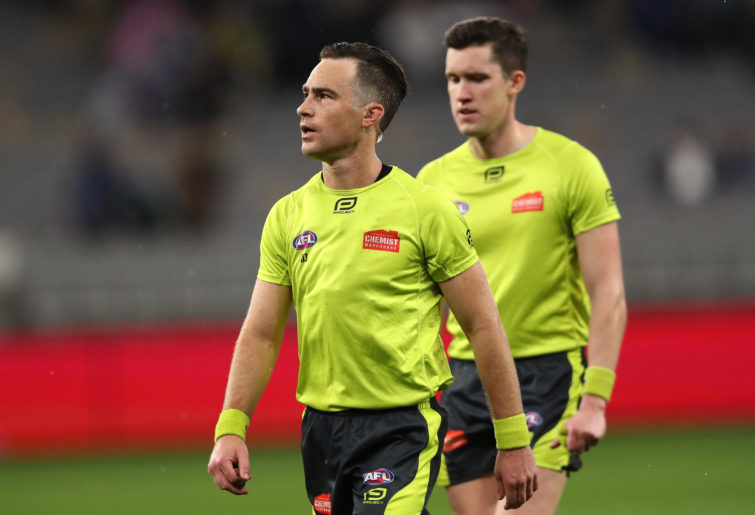
Stand. Stand. Stand. Play on. Back a metre. Stand. Play on. Play on. Stand. Back two metres. One more. One more! Stand. Stand. Play on. Stand. Don’t infringe. Don’t give away a free. Stand. Back a metre. Stand. Play on. Insufficient intent. Stand. Prohibited contact. Stand. Arms out. Dissent. Fifty metres. Get out. Out! Stand. Stand. Play on. Play on, play on, play on! Infringement. Stand. Five-metre area. Fifty metres. Out. Out! Stand. Play on. Back a metre. Stand. Insufficient intent. Stand. Stand. You’ve got the ball, don’t give away a free. It’s your ball. Prohibited contact. Reversal. Arms out, that’s dissent, 50 metres. Stand. Play on. Stand. Play on. Nominate. Max? Sean? Okay. Warning. Six-six-six. Stand. Stand. Play on.
All of this and more, within 15 minutes of a game. Certainly before quarter time.
What the hell has happened to our game?
It’s bloody exhausting to watch, listening to the incessant yammering of the umpires. And notice, almost all of the above, which is ludicrous to see in isolation, is in relation to rules bought in during the last few years.
The umpires are whistle-happy at the moment, and it’s disgusting. It makes the game all but unwatchable.
There are three types of free kicks – the undisputed free, the 50-50s and the soft frees.
The undisputed free kicks are easy. A coathanger tackle. A pull of the jumper. An accidental whack on the face. A clear push in the back (unless it’s Tom Hawkins infringing).
The soft free kicks are the most infuriating. Incidental marginal contact that has no impact on the player or contest. A push or shove between two aggro players, usually off the ball. Neither of them is in any remote danger of injury, but one of them gets pinged.

(Photo by Paul Kane/Getty Images)
What is the actual point of these? Why are they paid? They don’t impact the play. No-one is getting hurt. What has it got to do with the officials at all? Do they fear a mass outbreak of anarchy?
And there are the 50-50s. Arguably the worst of all. What makes them so difficult to handle is that if they were all paid, we’d have 100 free kicks a game.
Each year it seems there are more rules, more interpretations. Never does it lead to fewer whistles. More free kicks. More whistles. More frustration of players, which leads to more free kicks, more penalties and more whistles.
How can the powers that be at AFL House not be embarrassed by what they’ve created?
In the Geelong-Adelaide game on Saturday there were 184 marks and 49 free kicks. That’s over 230 chances to yell stand, one every 30 seconds. Even if the stand rule has added any value, which is arguable at best, why do we have a sport where the participants are treated like babies and yelled at to stand still all game long? Seriously, what is that?
In ruck contests the players have to nominate to go for the ball like they’re in kindergarten.
Giving someone a slight push or a bump running past can lead to a free kick, reversal or 50-metre penalty.
The AFL tried to make this year about appreciating umpires. As is standard practice for this organisation, the reverse has applied. The umpires have been saddled with harder jobs, more to do and more grey areas, which has led to more frustration and more noise from fans, players and commentators alike.
Crowds are staying away from AFL matches. Is umpiring a factor? It’s certainly never been easier to fall out of love with the game.